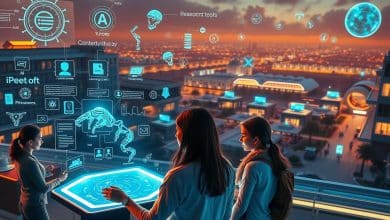Digital Skills You Need in 2025: Stay Ahead in a Rapidly Evolving Market
The professional world has transformed faster than ever. Tech advancements now dictate career trajectories, with automation and AI reshaping entire industries. Workers who adapt thrive, while others risk falling behind.
Artificial intelligence isn’t just changing factories—it’s altering office jobs, creative fields, and service roles. Many worry about machines replacing humans, but new opportunities emerge daily. Roles like AI trainers and data storytellers didn’t exist five years ago.
Nigeria’s job market reflects this global shift. Companies seek professionals who blend technical know-how with strategic thinking. From Lagos to Abuja, businesses prioritize workers who master tools like cloud computing and cybersecurity.
This shift creates a clear advantage for early adopters. Those learning emerging tools now secure better salaries and leadership roles. The key? Treat learning as continuous, not a one-time achievement.
Global demand for tech-savvy talent outpaces supply, especially in fast-growing economies. Professionals who stay curious and adaptable will lead tomorrow’s workforce. The future belongs to those who evolve with it.
Understanding the Landscape of Digital Skills in the Modern World
Employers now prioritize tech-driven capabilities that go far beyond basic computer knowledge. A decade ago, spreadsheet mastery secured jobs—today, analyzing datasets and interpreting AI outputs separates candidates. This evolution reflects how tools shape careers, with Lagos banks and Abuja startups alike seeking workers fluent in emerging systems.
Industry Trends Shaping the Digital Era
Automation handles repetitive tasks, letting humans focus on strategy and innovation. Artificial intelligence now optimizes supply chains and personalizes customer experiences across Nigeria’s retail sector. Meanwhile, blockchain secures transactions for fintech firms, and IoT devices monitor infrastructure in real time.
Impact of Technology on Job Roles
Roles like social media manager barely existed 15 years ago—now they’re essential. Quantum computing’s rise will soon demand specialists who bridge physics and programming. Workers who adapt thrive, while those clinging to outdated methods face obsolescence. Continuous learning isn’t optional; it’s career insurance.
Mastering Digital Skills Development
Modern workplaces demand more than technical proficiency—they require adaptive thinking and foresight. Organizations that prioritize structured training initiatives see 4.1 times higher success rates in tech adoption, per McKinsey research. This approach turns employees into innovators who drive progress rather than just following trends.
Intelligent Systems Reshape Workflows
AI and automation now handle routine tasks while creating roles like ethics auditors and workflow designers. Nigerian fintech firms use these tools to detect fraud and personalize services. Workers who understand both machine logic and human needs become irreplaceable collaborators.
Guarding Information in Connected Ecosystems
Cyber threats increased 350% globally since 2013, with Nigeria facing rising attacks on financial systems. Professionals need expertise in encryption, threat detection, and regulatory compliance.
The EU DigComp framework identifies security as a core competency, emphasizing proactive protection strategies.
Data mastery now includes ethical analysis and translating insights into decisions. From Lagos e-commerce platforms to Abuja health-tech startups, teams value those who secure assets while unlocking their strategic value. This dual focus separates surviving businesses from thriving ones.
Key Digital Skills for 2025 and Beyond
By 2025, professionals who combine technical mastery with creative problem-solving will dominate Nigeria’s job market. Three areas stand out as non-negotiable for career growth: intelligent systems, data-driven decision-making, and audience engagement through innovative channels.
Artificial Intelligence & Machine Learning
AI now powers everything from Lagos traffic management to diagnostic tools in Abuja hospitals. Workers need to understand how algorithms analyze patterns and automate decisions. Practical implementation matters more than theoretical knowledge—like using machine learning to predict customer behavior or optimize energy use.
Data Literacy and Cloud Computing
Businesses seek professionals who turn numbers into narratives. This means extracting insights from spreadsheets, visualizing trends, and securing information on cloud platforms. Nigerian banks now train staff to manage hybrid cloud systems while maintaining strict security protocols.
Digital Marketing and Content Creation
Social media’s $1.5 trillion valuation by 2030 reflects its economic power. Brands need experts who craft viral campaigns and measure ROI across platforms. Storytelling through video and interactive posts often outperforms traditional ads. Meanwhile, no-code tools let marketers build apps without coding expertise.
“Content isn’t king unless it drives action,” notes a Lagos-based growth strategist. “The best creators mix analytics with cultural awareness.”
These competencies create professionals who adapt as fast as technology evolves. From AI-driven agriculture to cloud-based retail, Nigeria’s economy rewards those ready to lead the next wave of innovation.
Enhancing Career Opportunities Through Digital Skills
Workplaces now operate in a transformed reality where geography no longer limits opportunity. Professionals who master collaboration tools and virtual platforms unlock doors previously closed by location or infrastructure. This shift reshapes how Nigerians compete locally and globally.
Boosting Employability in Nigeria’s Evolving Job Market
Lagos startups and multinational corporations alike prioritize candidates fluent in cloud-based systems and AI analytics. A recent survey shows 68% of Nigerian hiring managers filter applicants based on proficiency with project management software. Workers who demonstrate these abilities often secure roles faster and negotiate higher salaries.
Three factors drive this trend:
- Expanding fiber-optic networks enable seamless participation in global projects
- International firms seek cost-effective talent familiar with tools like Trello and Asana
- Local industries digitize operations, creating hybrid roles blending tech and sector expertise
“We no longer see remote work as a pandemic contingency—it’s a strategic advantage,” says a Lagos-based HR director. “Teams that master virtual collaboration outperform office-bound competitors.”
Adapting Skills for Remote and Hybrid Work Environments
Hybrid models demand more than Zoom meetings. Professionals thrive by combining technical know-how with soft skills like time-zone navigation and asynchronous communication. Nigerian employees using encrypted file-sharing platforms report 42% fewer project delays compared to traditional methods.
Key adaptations include:
- Learning to manage distributed teams using Slack or Microsoft Teams
- Securing sensitive data across shared networks
- Automating routine tasks to focus on high-impact work
This evolution rewards those who treat tools as extensions of their professional identity. As infrastructure improves, Nigerians gain equal footing with global peers—provided they embrace continuous learning.
Effective Strategies for Continuous Digital Learning
Staying relevant requires more than occasional upgrades—it demands systematic adaptation. Education and training form the backbone of this process, blending classroom instruction with real-world application. Forward-thinking professionals now treat knowledge acquisition as daily practice, not periodic events.
Lifelong Learning and Hands-On Experience
Regular skill updates keep professionals ahead of industry shifts. Many Nigerians now combine online courses with local internships, applying new tools to solve community challenges. A Lagos-based developer recently credited her career growth to weekend coding bootcamps paired with fintech projects.
Three approaches deliver results:
- Monthly workshops through platforms like Coursera
- Collaborative hackathons solving Nigerian business problems
- Mentorship programs connecting juniors with tech leaders
These methods turn theoretical knowledge into market-ready expertise. Employers increasingly value portfolios over certificates alone.
Corporate Training and Online Education Platforms
Companies now allocate 23% more budgets to employee development than in 2020. Major banks like GTBank run internal academies teaching cloud systems and AI implementation. Blended learning models—mixing live sessions with on-demand modules—prove most effective.
“Our staff retention tripled after launching tailored training programs,” notes a Lagos HR manager. “People stay where they grow.”
Platforms like Udemy and local Edtech startups make specialized knowledge accessible across Nigeria. Busy professionals can master blockchain basics during commutes or study UI design after work hours. This flexibility bridges gaps between urban hubs and rural areas.
Overcoming Challenges in the Digital Shift
Navigating the transformation requires confronting systemic barriers head-on. Many Nigerian professionals face a disconnect between their current capabilities and employer expectations. This mismatch slows career growth and limits organizational progress.
Bridging the Skills Gap and Adapting to Change
Access to training remains uneven across regions. Urban hubs like Lagos benefit from tech hubs, while rural areas often lack reliable internet. Affordable online platforms help bridge this divide, offering courses in AI applications and cloud management.
Businesses increasingly partner with local academies to create tailored programs. A recent initiative in Abuja connects banking professionals with cybersecurity certifications. “Customized training drives real impact,” notes a fintech executive. These collaborations align workforce abilities with emerging industry needs.
“Change-resistant teams become obsolete within 18 months. Adaptation isn’t optional—it’s survival.”
Rapid tech evolution demands ongoing education. Workers who dedicate 5 hours weekly to learning report 34% faster promotions. Companies now integrate microlearning into workflows through apps like uLesson, enabling skill updates during commutes or breaks.
Successful organizations foster cultures where experimentation is encouraged. Monthly hackathons and sandbox environments let teams test ideas without risk. This approach turns challenges into stepping stones for innovation.
Future Trends in Digital Transformation
Nigeria’s economic landscape will soon mirror global tech revolutions, with local innovators leading the charge. From Lagos markets to Abuja offices, businesses are adopting tools that blend automation with human creativity. These advancements promise to solve longstanding challenges while creating new career paths.
Emerging Technologies Reshaping Industries
Farmers now use AI-powered sensors to predict crop yields, reducing waste across Nigeria’s agricultural sector. Blockchain secures cross-border payments for Lagos fintech startups, cutting transaction costs by 40%. Meanwhile, IoT devices monitor energy grids in real time, preventing outages in growing cities.
Healthcare providers deploy machine learning to diagnose diseases earlier, improving patient outcomes nationwide. These innovations demand professionals who understand both technology and local contexts. Workers who master these systems today will shape tomorrow’s economic successes.
FAQ
How can professionals in Nigeria boost employability in evolving industries?
Which industries face the highest disruption from automation?
Why is cybersecurity a priority for businesses today?
What platforms are recommended for learning cloud computing?
How do hybrid work models affect required competencies?
What methods help organizations address tech talent shortages?
Is traditional marketing still effective alongside digital strategies?
How can employers foster a culture of continuous learning?
Which technologies will drive transformation by 2025?
Why is data literacy vital for non-technical roles?
Published on: 21 de July de 2025

Bakari Romano
Bakari Romano is a finance and investment expert with a strong background in administration. As a dedicated professional, Bakari is passionate about sharing his knowledge to empower individuals in managing their finances effectively. Driven by this mission, he founded FinancasPro.com, where he provides insightful and practical advice to help people make informed financial decisions. Through his work on the site, Bakari continues to make finance accessible and understandable, bridging the gap between expert knowledge and everyday financial needs.






